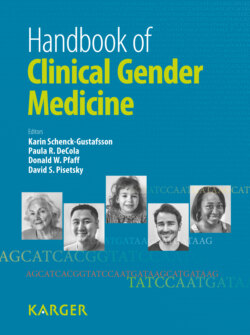Читать книгу Handbook of Clinical Gender Medicine - Группа авторов - Страница 115
На сайте Литреса книга снята с продажи.
The Immunoreactive Theory of Selective Male Affliction
ОглавлениеThis is a theory that posits that male-specific antigens from male fetuses may enter the maternal circulation and activate the mother’s immune system. The mother then produces antibodies to the male antigen which cross the placental barrier and enter the fetal brain, where they alter brain development [32]. A maternal immune response could also alter brain development through transplacental transfer of proinflammatory cytokines (a different product of the immune system) and an altered hormonal milieu caused by immune system-mediated enlargement of the placenta. Animal research indicates that the immune system of pregnant females does recognize and react to fetal male-specific antigens, male fetuses are more antigenic to human mothers than female fetuses, and male-specific antigens are strongly represented on the surface of brain cells. Relevant to this hypothesis is the observation that mothers of children with ASC show an aberrant immune response to their child’s lymphocytes [33].
